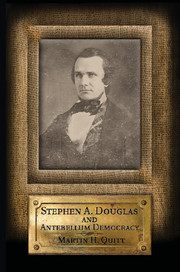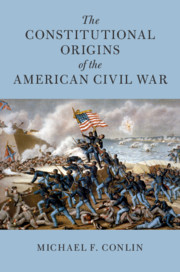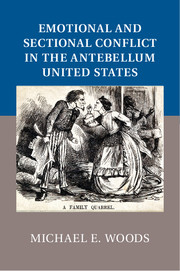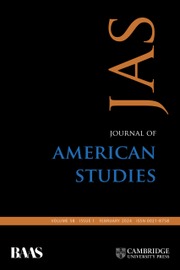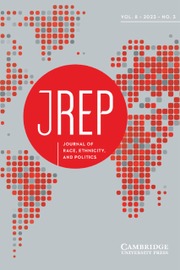Stephen A. Douglas and Antebellum Democracy
This thematic biography demonstrates how Stephen Douglas's path from a conflicted youth in Vermont to dim prospects in New York to overnight stardom in Illinois led to his identification with the Democratic Party and his belief that the federal government should respect the diversity of states and territories. His relationships with his mother, sister, teachers, brothers-in-law, other men, and two wives are explored in depth. When he conducted the first cross-country campaign by a presidential candidate in American history, few among the hundreds of thousands that saw him in 1860 knew that his wife and he had just lost their infant daughter or that Douglas controlled a large Mississippi slave plantation. His story illuminates the gap between democracy then and today. The book draws on a variety of previously unexamined sources.
- Connects the personal and family history of a major figure with his political principles and behaviour
- Integrates political, social and cultural history through the lens of a single distinctively American life of the Early Republic
- Draws on documents previously unknown, unexamined or unused
Reviews & endorsements
"Remarkable, insightful, and original, this biography of one of the most important nineteenth-century political leaders illustrates the complexities of policy making and partisan advocacy. With strong theoretical underpinnings, Quitt uses empirical evidence from primary sources to construct the time and place of Douglas’s life, the literature on Douglas, the political history, his debates with Lincoln, and his family and gender history. This is a significant piece of historical scholarship for Civil War and antebellum historians, for gender and family historians, and for all interested in this critical period of U.S. history."
Orville Vernon Burton, Distinguished Professor of Humanities, Clemson University, and author of The Age of Lincoln
"Anyone who thinks there is nothing new to say about Douglas will be surprised by Martin Quitt’s innovative treatment of this central figure in Jacksonian Democracy. Quitt taps previously unused sources to offer fresh perspectives on Douglas’s troubled youth and family life, his connections to slavery and to the masculine political world, his constitutional thought, and his unconventional electioneering spree in 1860. His probing book should become the reader’s first stop for a thematic overview of this misunderstood American statesman."
Yonatan Eyal, University of Toronto, and author of The Young America Movement and the Transformation of the Democratic Party, 1828–1861
"In this revealing exploration of Stephen A. Douglas's private and public lives, Martin Quitt offers a well-grounded portrait of Douglas as an avatar of one sort of democratic politics and constitutionalism in the antebellum period. Creatively building on Douglas's personal history and psychology, Quitt portrays one of the most important politicians of the age as a principled advocate of democratic localism but also as a vigorous defender of the racism that ultimately poisoned his and the nation's democratic ambitions."
Gerald F. Leonard, Professor of Law and Law Alumni Scholar, Boston University School of Law
"Who really was the fiery ‘Little Giant’ from Illinois whose political career provided a foil for Abraham Lincoln? In his masterful analysis of Stephen A. Douglas's life, Martin H. Quitt has revealed the complex social and psychological origins of Douglas's politics. Drawing on previously unexamined sources, Quitt elucidates the meanings of the homosocial political world in which Douglas operated and explores the complexity of his public decisions expressed in the Compromise of 1850, the Kansas-Nebraska Act, and the presidential election campaign that ended with the South's secession. Gracefully written and compelling, this book is a must-read for all students of American politics."
Rosemarie Zagarri, George Mason University, and author of Revolutionary Backlash: Women and Politics in the Early American Republic
"… it throws an interesting light on certain aspects of Stephen A. Douglas’s life and career, bringing attention to a consequential man long lost in Lincoln’s shadow."
Edward Achorn, The Weekly Standard
"Quitt’s book is very good …"
Ken I. Kersch, Law and Politics Book Review
"Martin Quitt's book is solid proof that there is life again for Stephen Douglas scholars. Quitt makes good use of new ideas from psychology and gender studies, as well as new evidence, to enliven and sharpen our understanding of the Little Giant."
Michael D. Pierson, Register of the Kentucky Historical Society
"… impressively researched monograph …"
Matthew Norman, Journal of Illinois History
"Martin H. Quitt’s sympathetic but unapologetic biography of Stephen A. Douglas departs from traditional studies of one of the dominant political figures of the antebellum era."
Erik B. Alexander, Journal of American History
"In terms of research, the book is marvelous; the author’s intensive labor in secondary sources is awe-inspiring, and he has found new primary sources concerning Douglas’s education, family, and marriage to Adele Cutts."
James L. Huston, Journal of the Early Republic
"Martin H. Quitt’s interpretation of Stephen A. Douglas is intriguing, and original."
Graham A. Peck, Journal of Illinois State Historical Society
"… demonstrates the enormous potential of political analysis interwoven with cultural and social history. … a fascinating study of the social, cultural, and psychological, as well as ideological origins of Douglas’s fervent belief in the right of (white) local majorities to control their own institutions - that is, in popular sovereignty. Employing manuscript collections, public records, local histories and political documents, Quitt argues that Douglas’ commitment to popular sovereignty predated and transcended his antebellum political and economic interests. … a nuanced analysis of a flawed statesman and the doctrine that defined his career."
Civil War History
Product details
September 2012Paperback
9781107639010
220 pages
234 × 155 × 14 mm
0.39kg
1 table
Available
Table of Contents
- 1. Adolescence in Vermont
- 2. Schooling, learning and passing the bar
- 3. Family influence, stress and bonds
- 4. Democratic prodigy in Illinois
- 5. Douglas's constitutionalism, part i: noncitizen voting, apportionment and internal improvements
- 6. Douglas's constitutionalism, part ii: slavery in the territories
- 7. The campaign of 1860 and the code against campaigning
- 8. In Lincoln's shadow
- 9. Douglas's Mississippi slaves.

